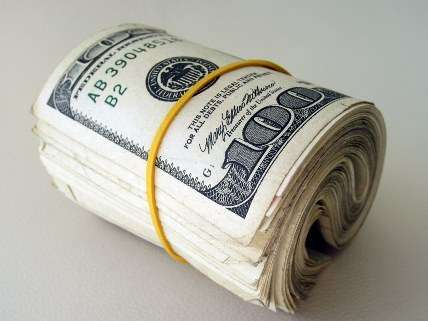Americans 'Hoard' Cash? It's Probably Fueling the Shadow Economy

The Federal Reserve Bank of St. Louis wants to know where in hell all of the money injected into the system in recent years by the Fed has gone. Common assumptions say it was supposed to be a shot of Vitamin B in the nation's ass—the country's Gross Domestic Product should be floating upwards on the tidal wave of dollars, with inflation soaring along. But that's not happening. The reason, conclude Yi Wen, Assistant Vice President and Economist, and Maria A. Arias, Research Associate, "lies in the private sector's dramatic increase in their willingness to hoard money instead of spend it."
Could be. Maybe all of the money is sitting in duffel bags under the bed. Or maybe other economists are right that money is pouring into a vast shadow economy that runs parallel to the official one, but out of reach of regulators and tax collectors.
What has the Federal Reserve analysts fascinated is that dollars just aren't running through the system the way they used to. "During the first and second quarters of 2014, the velocity of the monetary base was at 4.4, its slowest pace on record. This means that every dollar in the monetary base was spent only 4.4 times in the economy during the past year, down from 17.2 just prior to the recession."
If old assumptions held for the circulation of money, "inflation in the U.S. should have been about 31 percent per year between 2008 and 2013." Instead, it was less than 2 percent by official measures. Damned good thing, too, unless you really dig wheelbarrows.
That's because, say the authors, interest rates are so damned low as a result of Fed policy, and the economy so sluggish, that people are just sitting on cash instead of spending or investing it.
Just sitting on money?
Maybe. But another explanation was put forward by the economist Edward Feige, who argued recently that a lot more cash than traditionally assumed is circulating domestically. Where others estimated that half or more of all U.S. currency flows overseas, he said 75 percent or so is actually at home.
Again, is it just sitting there because of low interest rates and economic doldrums?
Nope. Feige estimates that, in 2009, "18-23% of total reportable income may not properly be reported to the IRS." That missing $2 trillion or so makes for a rather lower income tax compliance rate than the official 83.1 percent estimated by the IRS.
Which is to say, according to Feige, the money isn't being hoarded (although some is certainly stashed for a rainy day), but it's being channeled into the shadow economy of otherwise legal goods and services to escape taxes and regulations. Much of it probably flows to outright illegal black market activities, too. But the huge increase in cash in private hands suggests less in the way of massively increased demand for hookers and blow than it does a growing parallel economy.
The Federal Reserve economists don't go there. But their questions about where all that money has gone are very interesting. And it makes more sense that it's being put to some sort of so far untracked use than that it's all just gathering dust.
